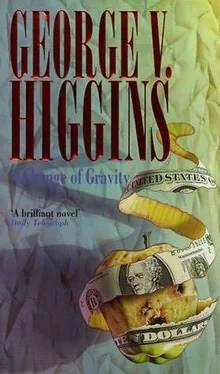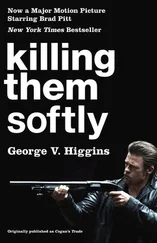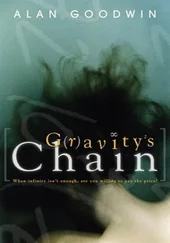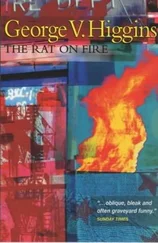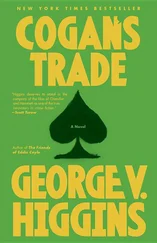George Higgins - A change of gravity
Здесь есть возможность читать онлайн «George Higgins - A change of gravity» весь текст электронной книги совершенно бесплатно (целиком полную версию без сокращений). В некоторых случаях можно слушать аудио, скачать через торрент в формате fb2 и присутствует краткое содержание. Жанр: Криминальный детектив, на английском языке. Описание произведения, (предисловие) а так же отзывы посетителей доступны на портале библиотеки ЛибКат.
- Название:A change of gravity
- Автор:
- Жанр:
- Год:неизвестен
- ISBN:нет данных
- Рейтинг книги:5 / 5. Голосов: 1
-
Избранное:Добавить в избранное
- Отзывы:
-
Ваша оценка:
- 100
- 1
- 2
- 3
- 4
- 5
A change of gravity: краткое содержание, описание и аннотация
Предлагаем к чтению аннотацию, описание, краткое содержание или предисловие (зависит от того, что написал сам автор книги «A change of gravity»). Если вы не нашли необходимую информацию о книге — напишите в комментариях, мы постараемся отыскать её.
A change of gravity — читать онлайн бесплатно полную книгу (весь текст) целиком
Ниже представлен текст книги, разбитый по страницам. Система сохранения места последней прочитанной страницы, позволяет с удобством читать онлайн бесплатно книгу «A change of gravity», без необходимости каждый раз заново искать на чём Вы остановились. Поставьте закладку, и сможете в любой момент перейти на страницу, на которой закончили чтение.
Интервал:
Закладка:
Hilliard looked up. "And that's really all that I know, Amby," he said earnestly. "I know you don't like Bob, but at least after you see him, you'll probably know what it is we have to contend with. And that will be before I do." Then he registered Merrion's expression of beguiled surprise. He spun in his chair and looked back into the kitchen, now unoccupied once more. He turned back and looked at Merrion. "What's with you?" he said. "Are you all right?"
Realizing he'd been holding his breath, Merrion exhaled heavily and smiled at Hilliard. "I think I am," he said. "I'm still worried, of course, but for now that's secondary. You said something about ghosts just then: I could swear I just saw one right there in your kitchen.
Has to be since it was the spitting image of your ex-wife, and I know she's on Martha's Vineyard so that couldn't be." Hilliard's face reddened. "Barged in on reunion night, did I?" Merrion said, grinning now. "Little duet of "Auld Lang Sync," I take it?"
Hilliard squirmed in the chair. He found his practiced sheepish grin and turned it on. "I've discovered that I may be getting old, Amby," he said. "And this world isn't getting any warmer. I find I still need all the friends I can get, even if only occasionally."
Merrion finished his drink and stood up. "Can't argue with you there, pal," he said. "Can't argue with you there at all."
SEVENTEEN
Leaving his house late in the morning of the third Sunday in August, Merrion was mildly pleased to register another day of sunshine. He began to feel actual cheer. The change surprised him; he'd been resigned to plodding through the day as best he could, resisting anxiety. He went to the grey and white house with the pale yellow front door on Pynchon Hill where Diane Fox had lived with Walter amid much laughter and not just when they had friends over for dinner, either, although there had been a lot of that.
Merrion had always liked Walter Fox, 'always' having commenced in 1972 when he had first begun to get to know the red-haired ruddy-faced man with the bristling red handlebar mustache. Succeeding to the seat Larry Lane had occupied and left to him along with his ownership interest in the Fourmen's Realty Trust he found he had inherited Walter Fox along with the wealth. Fox's place had belonged io his late grandfather, Phil, who had died in '68.
The trust had been set up in September of 1956. The original investors were Charles Spring, Roy Carnes, Larry Lane and Finnis D.L. "Fiddle'
Barrow. Spring did the legal work, drawing up the declaration of trust, originally making his son, Edmund, practicing law in Boston, the nominal administrator, unpaid, omitting the names of the beneficiaries who were the actual trustees. The document made each interest in the trust indivisible in itself, inseparable from the remainder of the corpus, and non-transferable by conveyance or special mention in a will, except by express statement, oral or in writing, addressed to the other trustees, of testamentary intent to make a gift, or by testamentary deed of trust, to take effect in the event of disabling incompetence or death of the beneficiary.
At the initial meeting of the trustees, held on the second Sunday in November at the headquarters of the Barrows Construction Co. at the sand pits in Hampton Falls, Spring had described the trust agreement to the others as a cordon sanitaire. "Discretion is important to us. If one of us dies, as all of us someday surely will, we do not want estate appraisers rummaging around in this operation, asking awkward questions. That's why we're making it a lock-box: very hard to get into; you had to be there. Almost impossible to get out of by yourself unless you're literally willing to die in the attempt."
The instrument provided that in such event, or upon application by a beneficiary or his attorney-in-fact for liquidation of his interest, the value of the interest would be determined by appraisal, and the surviving beneficiaries at their sole option and discretion choose either to admit the decedent's designee to his vacant place, or if for reasons of uncertainty or reservations about his suitability they chose not to, thereupon either by additional capital infusion or by sale of trust assets redeem the interest of the late beneficiary by payment to his successor in interest an amount equal to the value of his prorata share.
The original arrangement soon proved to be geographically unwieldy. For that and other reasons, including perceived risk, in 1961, five years before the statute of limitations would bar state prosecution of any criminal offense possibly committed in connection with construction of the courthouse, Spring had thought it best to suggest to Edmund that he draw up the document substituting Philip Fox of Hampton Pond as the managing trustee of record.
Fox owned and operated the Fox Agency, Real Estate amp; Insurance. Fox's firm had handled the bonds underwriting the courthouse construction, so he had followed the project attentively and was keenly aware of its many ramifications. His agreement to serve as trustee specified that at the end of his first year he would be credited with a management fee of a ten percent ownership of the Fourmen's Trust fund, subject to divestment should he fail for any reason to serve for a total of at least five years. For the next four years thereafter he would annually receive a further interest amounting to two-and-one-half percent of the value of the fund that year, also subject to divestment if he failed to complete the specified term of five years. Thereafter he would participate in gains and losses on equal terms with the original four holders. While his duties as managing trustee would continue, he would cease to receive any additional compensation. Everyone involved in his admission to membership understood the interest he received to be hush money, although Lane was the only one who called it by that name at meetings, causing the others to wince.
Lane though blunt was right. Fox's addition to the trust served prudence as well as managerial efficiency. From his bonding work he knew that the original monies constituting the corpus of the trust consisted entirely of kickbacks from rigged-bid contracts and subcontracts for materials involved in the project, completed in 1957.
The total came to about $135,000, slightly over eleven percent of the total cost of the building and grounds.
Spring conservatively oversaw its enlargement in the bond market. Nine years later he had more than doubled it, to approximately $315,000. On his advice the trustees then voted to begin gradual diversification of their holdings, transferring some of the profits from the bond accounts into common stocks and investing the rest in real estate, both by purchasing undeveloped land and by buying up mortgages insured by the government. In 1970, Barrows had commenced construction of the trust's first cautious venture in long-term ownership of residential real estate, the sixteen-unit apartment building at 1692 Eisenhower Boulevard, at a rock-bottom cost of $7,100 per unit $113,600. The trustees also accepted Spring's recommendation that the trust become more aggressive in the stock market, using about seventy percent of their remaining capital to purchase common stocks issued by companies among the 500 indexed by Standard amp; Poor.
At the close of the 1968 spring meeting, Philip Fox had reported having been badly frightened by a premonition, and to be on the safe side wished to vouch for his grandson's bona fides and ability to keep his mouth shut; in the event of his death, he said, it would be his wish that the surviving original trustees/beneficiaries allow Walter to succeed him as both trustee and beneficiary. The other trustees dutifully scoffed at his superstitious ness but agreed. In November they carried out his wishes, voting to admit Walter, not so incidentally carrying out their preference not to disturb the corpus of the trust as would have been necessary if they had chosen to buy him out.
Читать дальшеИнтервал:
Закладка:
Похожие книги на «A change of gravity»
Представляем Вашему вниманию похожие книги на «A change of gravity» списком для выбора. Мы отобрали схожую по названию и смыслу литературу в надежде предоставить читателям больше вариантов отыскать новые, интересные, ещё непрочитанные произведения.
Обсуждение, отзывы о книге «A change of gravity» и просто собственные мнения читателей. Оставьте ваши комментарии, напишите, что Вы думаете о произведении, его смысле или главных героях. Укажите что конкретно понравилось, а что нет, и почему Вы так считаете.
